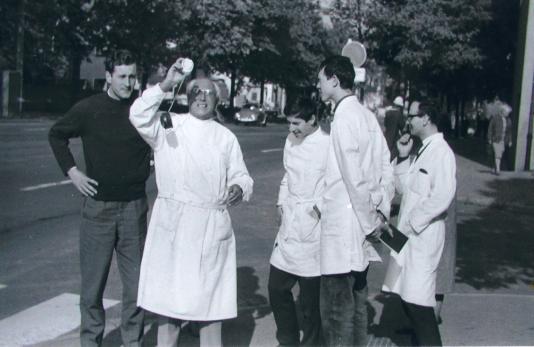Pursuing Knowledge of Artists’ Materials Production and Conservation Expertise as War Booty

Lecture
In-PersonHarvard Art Museums, Menschel Hall, Lower Level
Enter at Broadway for evening programs
Allied government intelligence agencies working in Germany during the closing chapters of World War II and immediately after invited various official bodies and businesses to join them in collecting commercial information from the defeated nation. Among many industries, artists’ colormen eagerly participated in the state-sponsored sequestration of German intellectual property by seeking out information related to the processes and conservation of pigments, binders, canvas, inks, and other materials, products, and practices.
In this lecture, Morwenna Blewett, paintings conservator and associate member of Worcester College at the University of Oxford, will explore the role of representatives of British color manufacturers Winsor & Newton, Ltd., and George Rowney & Company, who spent nearly a month in Germany attempting to gain knowledge of German art materials in order to improve their own.
Blewett will also discuss how new research reveals that some of the most august art institutions in London, the National Gallery and the Courtauld Institute of Art among them, made every effort to profit from expertise gathered from a professor named Kurt Wehlte. They sought his knowledge about art materials, conservation, and teaching—despite the significant roles he played in the National Socialist genocidal and totalitarian regime.
Speaker:
Morwenna Blewett is a paintings conservator and an associate member of Worcester College at the University of Oxford. She trained as a conservator at the Courtauld Institute in London and has served as a conservation fellow in the Straus Center for Conservation and Technical Studies at the Harvard Art Museums; the Worcester Art Museum in Worcester, Massachusetts; Worcester College at the University of Oxford; and the Ashmolean Museum at Oxford. She has worked as a paintings conservator at the National Galleries of Scotland, the National Gallery in London, and the Hamilton Kerr Institute at the University of Cambridge.
Free admission, but seating is limited and available on a first-come, first-served basis.
The lecture will take place in Menschel Hall, Lower Level. Doors to the hall will open for seating at 5:45pm.
Limited complimentary parking is available in the Broadway Garage, 7 Felton Street, Cambridge.
Please see the museum visit page to learn about our general policies for visiting the museum.
Support for the lecture is provided by the M. Victor Leventritt Fund, which was established through the generosity of the wife, children, and friends of the late M. Victor Leventritt, Harvard Class of 1935. The purpose of the fund is to present outstanding scholars of the history and theory of art to the Harvard and Greater Boston communities.
The Harvard Art Museums are committed to accessibility for all visitors. For anyone requiring accessibility accommodations for our programs, please contact us at am_register@harvard.edu at least 48 hours in advance.
